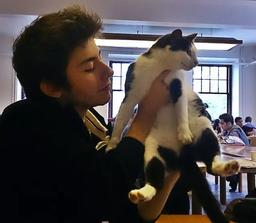Below you see the personal pronouns with accusative and locative case suffixes:
| Nominative | Accusative | Locative |
|---|---|---|
| ben | beni | bende |
| sen | seni | sende |
| o | onu | onda |
| biz | bizi | bizde |
| siz | sizi | sizde |
| onlar | onları | onlarda |
As you can see, we can form these by just adding the suffixes (y)İ and DE after the pronoun. The only exception is that the third person singular uses n as a buffer letter, before the suffix follows.
Below are some example sentences. Note that the locative can also be used for expressing possession.
| I love you. | Seni seviyorum. |
| We are eating at his place. | Onda yiyoruz. |
| I have no money. | Bende para yok. |
| You have the pen. | Kalem sizde. |
| He is beating her. | Onu dövüyor. |
Be careful with the response to Seni seviyorum. You should say Ben de seni seviyorum and not Seni de seviyorum. The sentence Seni de seviyorum implies that you love others besides your partner.
Your questions are stored by us to improve Elon.io

